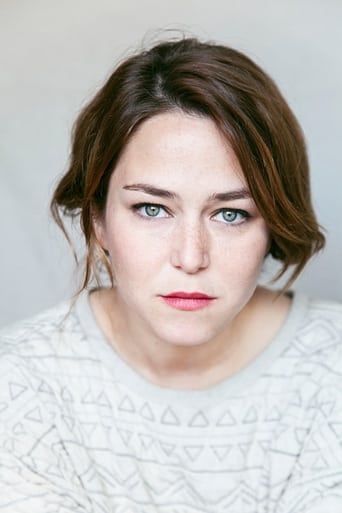ma-cortes
Downbeat but enjoyable film with magnificent performances , specially by Pilar López De Ayala . Dramatic picture about the consequences of Spanish civil war , being realized with academicism and general coldness , but dealing with a dark fact during Spanish Civil War (1936-39) and post-war . Despite their innocence , thirteen young girls (Pilar López De Ayala , Verónica Sánchez , Gabriella Pession , Nadia De Santiago , Marta Etura , Bárbara Lennie , Teresa Hurtado De Ory , among others) were detained and condemned with no trace of proofs of any wrong doing . Accused for rebellion , they are subsequently condemned to Death Row and soon executed beginning of the postwar era . ¨13 Rosas¨ results to be other of the innumerable stories to deal with dramatic deeds regarding the Civil War background , this time about thirteen totally normal young women were put in prison under made up charges of helping the rebellion against Francisco Franco dictatorship back in the 1940's , all of them unjustly accused and sentenced to death and executed shortly after the Spanish Civil War . A familiar theme about the global horrors of a fratricide war , impossible to forget to our cinema . Emilio Martínez Lázaro also writes the script and story along with Pedro Costa and Ignacio Martínez De Pisón , filmed in his usual formal and stylistic scholarship , without leaving a trace the thought-provoking issues , in terms of dramatic and narrative excitement , and adding tears guaranteed . Including a spotless pictorial cinematography and a willingness almost perfect of the elements of each shot , every sequence and every space . The main problem has to face "13 Rosas¨, beyond not being able to avoid falling into the politic pamphlet is precisely derived from the coldness of its staging , which eventually become monotonous over two hours of footage . Because the story needs a vibration more real than the one offered in this slow-moving and sometimes boring film . ¨13 Rosas¨ bears remarkable resemblance to ¨La Voz Dormida¨ or "The voice asleep¨, with Inma Cuesta , María León , Ana Wagener being adapted from the novel by Dulce Chacón and directed by Benito Zambrano that entered the Spanish selection for Oscar . But anyway , its is compensated with the great performances from great actresses playing the girls that suffered harsh questioning , they are : Pilar López De Ayala , Verónica Sánchez , Gabriella Pession , Marta Etura and Bárbara Lennie , interpreters who provided a considerable boost to the result ; all the players are wonderful . Emilio Martínez Lázaro is a great director of actors and the main players are complemented by a good cast of secondaries (Félix Gómez , Fran Perea , Enrico Lo Verso , Goya Toledo , José Manuel Cervino , Teresa Hurtado De Ory , Asier Etxeandia , among others) forming a powerful human group of women and men and all of them giving excellent interpretations .Besides , it packs a colorful and appropriate cinematography . Being well photographed by the notorious cameraman Jose Luis Alcaine . As the pic offers an evocative photography by Jose Luis Alcaine who was first cinematographer to use fluorescent tube as "key" lightning and deemed to be one of the best Spanish cameramen . Alcaine frequently works with Pedro Almodóvar , Bigas Luna and Vicente Aranda , as he has photographed ¨The skin I live in¨ , ¨The bad education¨ , ¨Volver¨ , ¨Women in the verge of a nervous breakdown¨ , among others . Sensitive as well as adequate musical score by Roque Baños . Roque has composed excellent scores , he has made a prestigious career , as National : ¨800 bullets¨ , ¨Fragiles¨ , ¨Celda 211¨ , as International : ¨In the heart of the sea¨, ¨Cantinflas¨, ¨Old boy¨ , ¨Evil Dead¨ , ¨Machinist¨, ¨Sexy beast¨. This film was well directed by Emilio Martínez Lázaro . He was born in 1945 in Madrid , location in which he often shoots his films . He is a Spanish prestigious cinema director . Emilio is a director and writer, a good filmmaker expert on comedies as he has proved in : Los Peores Años De Nuestra Vida (1994) , El Juego Más Divertido (1998) and Amo Tu Cama Rica (1992) , drama : Las 13 Rosas (2007) La Voz De Su Amo (2001) , Musical as : Al Otro Lado De La Cama (2002) , Los Dos Lados De La Cama (2005) , among others . And , of course , his greatest successes : Ocho Apellidos Catalanes and Ocho Apellidos Vascos .
Jeffrey Boswell
"Las 13 Rosas" is concerned with the terrible reprisals that took place in the months of 1939 and 1940 which followed the end of the Spanish Civil War. Perhaps it was historical timing caused these events to go relatively unnoticed in the rest of Europe at the time, and to have faded from history since. But the facts need to be made known, and by chronicling the fate of these thirteen largely innocent young women, this brave film sheds a light on a very murky episode. Strange then that it never seems to have benefited from a proper release. Why is that? It is clearly an important film, competently made, very well acted, with admirably authentic sets and costumes. Could it be the subject matter that has put off any distribution investment? A German film with a similar theme - "Sophie Scholl: the Last Days" got world wide promotion and was very successful. On the face of it, this film is more important still, not only because the scale of the atrocity was larger, but also because it actually took place in peacetime. I was very lucky to have an opportunity to see it, only because it got a late night showing on the Australian film channel SBS recently. Good for them. Would that a UK channel would be brave enough to give "Las 13 Rosas" a showing. In my opinion this film is close to being a masterpiece, and anyone with a serious interest in the art of cinema, and its function as something more than mere entertainment, will want to see it.
HiPalmetto
Before seeing this film I was already familiar with the principal book covering the incident, Las Trece Rosas Rojas by Carlos Fonseca, and I think this helped me to keep track of what was happening on the screen. It tells the story of 13 young women who were executed as a group just a few months after the end of the Spanish Civil War. Amid promises of justice and national reconciliation many thousands of people who had been on the side of the democratically elected republican government were rounded up and put in overcrowded jails. These were often people who had only been on the edges of the political organisations or had joined political Youth organisations, the social organisations of the time. Most of the girls in this particular group were under legal age when they were executed, no more than children in the eyes of their contemporaries. At least one, the oldest, was entirely innocent of any association with the political left. She and her husband (executed separately) paying the price for helping a known communist and fellow musician and colleague evade the fascist repression. Executions of this type and on this scale continued for many months, perhaps several years.There is a lot to keep track of in the movie. Not that the storytelling was confused, the opposite is the case, but covering the stories of so many individuals can be demanding of the viewer. But thanks to a tight script, where possible using the actual words of the girls, and fine acting by the entire cast, especially those in the main roles, a real sense of the injustice and tragedy of the situation is ably conveyed, though we only really get to know half of the girls involved. Personally I think of this as almost a companion piece to Pan's Labyrinth. The direction of the story is much more conventional and realistic, but they both deal with the "reality" of how repressive political systems crush the innocence and spirit of youth.For some reason, the film has only had a lukewarm reception from the political left in Spain, though it is an extremely important addition to the body of film concerning the Civil War. Perhaps it is slightly too subtle for the mood of the times. One older woman in the cinema when I watched it certainly seemed to have expected a somewhat different film and felt moved to explain very loudly at the end to all present that the dictator Franco had known nothing of these executions! To get this reaction is quite an achievement in itself.




